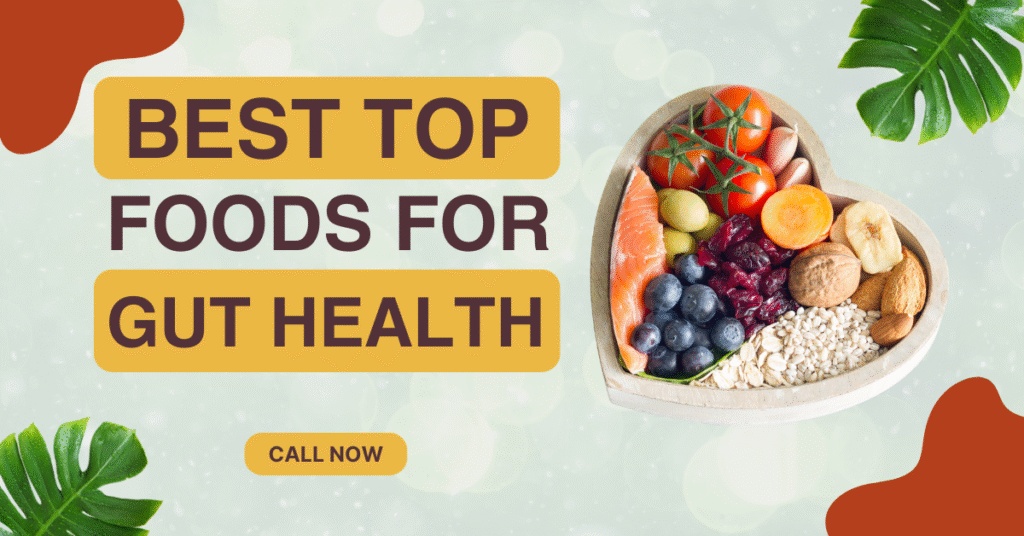
Gut Health: Your Second Brain and the Key to a Healthier Lifestyle
With the hectic pace of life today, increasing numbers of people are experiencing symptoms such as bloating, leaky gut, indigestion, acidity, constipation, and unexplained tiredness. What most of them do not know is that all these issues are strongly linked with gut health — the strength of your body and commonly referred to as your second brain.
As a health educator and dietician, I am noticing more and more people dealing with gut disorders that are due to our contemporary eating patterns and stressful living. The good news is, however: you can start healing your gut naturally and successfully. All it takes is to make small but intelligent decisions every day in your routine.
Let’s understand how your gut health influences your whole body, and what simple steps you can take to restore balance and feel your best every day.
What Is Gut Health and Why Is It Important?
Your gut houses trillions of microorganisms – or the gut microbiome. These beneficial bacteria help digest food, absorb nutrients, keep out unwanted pathogens, modulate immune response, and even manufacture hormones that influence your mood and brain.
When your gut is healthy, it’s like a well-lubricated machine: it digests food effectively, absorbs vital vitamins and minerals, and gets rid of waste without bloating or discomfort.
But when gut health is compromised, it causes a ripple effect of issues – from bloating, gas, indigestion, and acidity to more concerning issues like leaky gut, chronic fatigue, mood disorders, and even autoimmune diseases.
Gut-Brain Connection: Why Gut Is Referenced as the Second Brain
Your stomach is lined with more than 100 million nerve cells. This enteric nervous system (ENS) is communicating in real-time with your brain through the gut-brain axis. It’s why we get “gut feelings” and experience butterflies in our stomach when something is stressful.
Most importantly, your gut makes more than 90% of serotonin — the “happy” hormone — as well as a lot of dopamine and GABA, all of which control your mood, sleep, and stress levels.
An unhappy gut translates into an unhappy mind. That’s why digestive health is not only about digestion — it’s about your emotional, mental, and physical health.
Why Gut Problems Are So Prevalent Today
Several contemporary lifestyle choices have thrown the natural equilibrium of the gut microbiome off track:
• Processed food consumption in excess
• Underconsumption of fiber and excessive sugar and refined carbohydrates
• Sensitivity to or intolerance of gluten
• Inadequate fiber consumption
• Overuse of painkillers or antibiotics
• Dietary insufficiency of essential fatty acids
• Lack of physical exercise
• Inadequate sleep
These choices diminish good bacteria diversity, enhance inflammation, and compromise the strength of the intestinal lining, causing leaky gut, bloating, and impaired vitamin and mineral absorption.
Signs of Poor Gut Health
If you find that you are experiencing any of the following on a regular basis, it might be time to prioritize healing your gut:
• Frequent gas or bloating
• Constipation or loose stools
• Food intolerances (particularly dairy, gluten)
• Tiredness, even when you have slept well
• Mood swings or nervousness
• Skin issues (eczema, acne)
• Foggy brain or lack of concentration
• Cravings for junk food or sweets
These are your body’s ways of telling you that your gut and stomach health are out of balance and need some TLC.
Top 10 Simple & Easy Tips to Naturally Boost Gut Health
I’m a nutritionist who empowers individuals with simple and easy lifestyle changes that yield long-term benefits. My top tips to regain gut balance and feel light and energetic from the inside out are as follows:
- Begin Your Day With Warm Water + Lemon
Warm water with lemon will cleanse toxins, activate digestion, and regulate stomach acid in a natural way. Include ginger or soaked fennel seeds for an added advantage.
- Include More Fermented Foods
Foods such as curd, buttermilk, kimchi, sauerkraut, pickles, and kanji are loaded with probiotics that restore good bacteria in your digestive system.
- Eat Fiber-Dense Foods
Fiber is like a broom for your intestines. Include more seasonal fruits, vegetables, seeds, whole grains, and nuts to aid digestion and bowel movements.
- Stay Away from Gluten If You’re Sensitive
Most people nowadays are inadvertently sensitive to gluten (present in wheat, maida, semolina). If you feel bloated, brain foggy, or have skin problems after wheat foods, attempt to avoid gluten for a few weeks and observe the difference.
- Eat Slowly and Consciously
Digestion begins in your mouth. Chew slowly, eat without distractions, and allow your stomach to register fullness. This prevents indigestion and bloating.
- Drink Plenty of Water – Particularly Between Meals
Water facilitates the transport of nutrients and removal of waste. Drink 8–10 glasses daily, and take warm water between meals to promote digestion.
⸻
- Refuse Overeating and Nighttime Snacking
Late dinners or heavy meals close to bedtime disturb your body’s natural repair cycle. Keep dinner light and finish it at least 2 hours before sleep.
- Avoid Excess Sugar and Artificial Sweeteners
Sugar feeds harmful gut bacteria and increases cravings. Switch to natural sweeteners like dates, jaggery, or fruits in moderation.
- Manage Stress With Yoga or Meditation
Chronic stress closes down digestion and activates gut inflammation. Daily deep breathing, nature walks, yoga, or even 10 minutes of quiet time can normalize your gut-brain axis.
- Take Supplements for Gut Healing
Under professional supervision, you can take:
• Probiotics – to repopulate good bacteria
• Digestive enzymes – for enhanced nutrient uptake
• L-glutamine – for repair of the gut lining
• Vitamin D, Zinc, and Magnesium – for gut repair and immunity
Foods That Heal the Gut
Add these to your weekly diet:
Food
Benefit
Curd/Buttermilk
Natural probiotic
Banana
Rich in prebiotic fiber
Garlic & Onion
Feed good gut bacteria
Pumpkin & Lauki
Easy to digest, anti-inflammatory
Coconut Water
Hydrates & soothes the gut
Turmeric
Reduces gut inflammation
Aloe Vera Juice
Soothes the stomach lining
Avoid These Gut-Damaging Habits
• Drinking water immediately after meals
• Eating when not hungry
• Constant snacking without gaps
• Excess tea/coffee
• Ignoring the urge to go to the toilet
• Sleeping late
Gut Health and Hormones
Most people don’t know your hormones rely on your gut health. An upset gut can disrupt your thyroid, insulin, estrogen, and cortisol levels — causing weight gain, PCOS, fatigue, or mood disorders.
Healing your stomach and enhancing digestion automatically brings hormonal balance and emotional clarity.
Final Thoughts: Healing Begins in the Gut
Your gut is the basis of your health. If you’re not digesting correctly, nothing else will. But fixing your gut does not have to be hard or costly. With a few mindful shifts in diet, habit, and attitude, you can turn your energy, mood, and immunity around.
If you’re tired of feeling heavy, bloated, or disconnected from your body, start by listening to your gut – quite literally. Let your food and lifestyle work with your body, not against it.

